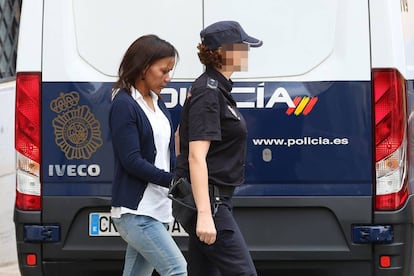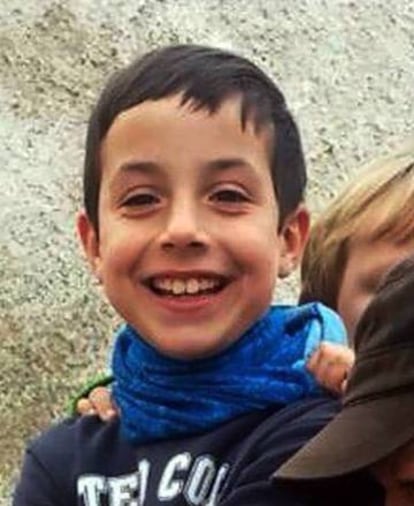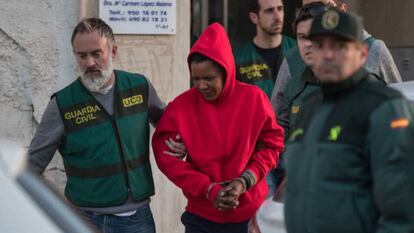Gabriel Cruz trial: “The only true thing she said is that she killed the child”
A jury is deliberating the case of Ana Julia Quezada, who could face as little as three years in prison or the equivalent of a life sentence, depending on the verdict

Inside a 15-square-meter room in Almería’s provincial courthouse, seven women and two men on Wednesday began to deliberate on the future of Ana Julia Quezada, the self-confessed killer of an eight-year-old child named Gabriel Cruz.
Sitting around a table, with a water fountain and an old-style TV set with a DVD player, the nine members of the jury started to consider which facts they consider to be proven following eight days of hearings that shed new light on the events of February 27, 2018, when Gabriel went missing, and the 11 days that elapsed until his body was found.

Quezada, who was then in a relationship with the child’s father, Ángel Cruz, confessed to the killing after police caught her moving the eight-year-old’s body in the trunk of her car.
Before that, she had participated in an extensive search for the child carried out inside Cabo de Gata natural park, a sparsely populated area of southern Spain where the boy resided. Quezada also planted one of Gabriel’s shirts at a spot near her ex-boyfriend’s house, in what the prosecution describes as an attempt to incriminate him and draw attention away from herself.
Before they began their deliberations, the jury received a brief from the judge in charge of the case, Alejandra Dodero, setting out instructions for answering more than 30 questions that have been put to them, according to the lawyer for the private prosecution in the case, Francisco Torres. The contents of the document were explained to the jury in open court by Dodero on Wednesday morning.

The jurors will now have to decide on the facts of Gabriel’s death in a rural property in Rodalquilar, which Cruz and Quezada were renovating. They will decide whether Quezada committed premeditated murder, as the public prosecutor has argued, premeditated murder with malicious intent, as the private prosecution claims, or reckless or intentional homicide, which is what her defense claims.
The charge that she is eventually convicted of will make the difference between a jail sentence as low as three years, or the highest possible under Spanish law: permanent reviewable prison, the equivalent of life with a possibility of parole after a fixed term.

The public prosecutor also wants Quezada to be sentenced to an additional 10 years in prison on two counts of inflicting psychological harm on Gabriel’s parents, since for 11 days after the child disappeared, there was an extensive search for him in which Quezada actively participated, making public shows of support for Gabriel’s father.
Inside the jury room, the jurors will be able to review images from the trial on the DVD player and consult court testimony and reports. The task ahead of them will be long and arduous, and not likely to be resolved today.
Closing arguments
On Tuesday, the last day of the hearings, the prosecution and the defense presented their closing arguments to the jury. The public prosecutor, Elena Fernández, described the animosity that the defendant harbored toward her partner’s child. Gabriel, she told the court, was an obstacle for the accused, and represented an emotional link between his father and mother.
“The emotional detachment that she showed toward this child has been proven, as was similarly the case with her daughter Judith,” Fernández told the court. That daughter was born to Quezada when the latter lived in Burgos, in northern Spain, around 20 years ago. Judith gave evidence through a video link at the Gabriel Cruz trial and testified to the difficult relationship between herself and her mother.

“She killed him in cold blood,” argued the public prosecutor, who nevertheless tried to scotch claims from the private prosecution that Quezada beat the child and then left him in distress during more than an hour before he died. For Fernández, the autopsy was clear: Gabriel died in a single act from suffocation.
The lawyer for Gabriel’s family, Francisco Torres, was as ruthless with Quezada as he had been throughout the trial. He focused on what he called her “intrinsically evil,” drawing attention to her lack of empathy, “leaving a four-year-old child behind in Dominican Republic, coming to Spain, working as a prostitute, and then that child falls from a seventh floor.” He was referring to her firstborn daughter, who died after falling out of a window in Quezada’s apartment in Burgos, an incident that was treated at the time as a tragic accident but has raised further suspicions about Quezada since Gabriel’s death. “She is an authentic sociopath,” Torres concluded.
Quezada’s defense lawyer, Esteban Hernández, closed the session with the longest arguments. He took 64 minutes to try to bolster the theory that Gabriel’s death was accidental, and that the fact that she buried him in such a shallow, improvised grave proved that there was no premeditation. He claimed that Quezada covered the child’s mouth to shut him up and to stop him from insulting her. When she realized the child had stopped breathing she entered into a “panic” and “was completely frozen and unable to accept what had happened.”
Her defense also argued that she hid her actions given that she was unable to confess the crime to her partner, and was also under the effects of sleeping pills.
“May God forgive me.” Those were the final words of Ana Julia Quezada at her trial on Tuesday. Sobbing, she also asked for forgiveness from the family of Gabriel, “my daughter and all my family, and everyone who is feeling bad by what I did. In general, all of Spain.”
English version by Simon Hunter.
Tu suscripción se está usando en otro dispositivo
¿Quieres añadir otro usuario a tu suscripción?
Si continúas leyendo en este dispositivo, no se podrá leer en el otro.
FlechaTu suscripción se está usando en otro dispositivo y solo puedes acceder a EL PAÍS desde un dispositivo a la vez.
Si quieres compartir tu cuenta, cambia tu suscripción a la modalidad Premium, así podrás añadir otro usuario. Cada uno accederá con su propia cuenta de email, lo que os permitirá personalizar vuestra experiencia en EL PAÍS.
¿Tienes una suscripción de empresa? Accede aquí para contratar más cuentas.
En el caso de no saber quién está usando tu cuenta, te recomendamos cambiar tu contraseña aquí.
Si decides continuar compartiendo tu cuenta, este mensaje se mostrará en tu dispositivo y en el de la otra persona que está usando tu cuenta de forma indefinida, afectando a tu experiencia de lectura. Puedes consultar aquí los términos y condiciones de la suscripción digital.









































